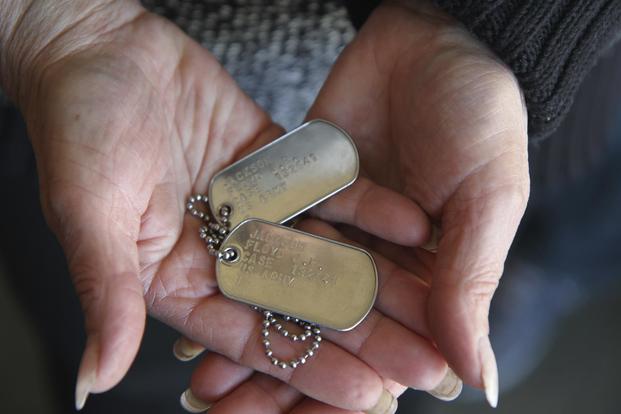North Korea has accepted two truckloads of wooden transfer caskets from the U.S. for the repatriation of the remains of about 50 U.S. troops missing from the 1950-53 Korean War, and the repatriation process could begin Friday, South Korea's Yonhap news agency reported.
A representative of the Defense POW/MIA Accounting Agency reportedly is in South Korea for the possible transfer, but there was no immediate confirmation from the DPAA.
"North Korea recently took two truckloads of wooden boxes to be used for the remains repatriation. It's expected to hand over the remains on July 27 as agreed upon," Yonhap said, citing a diplomatic source.
In the past, North Korea has chosen significant dates for major policy moves or statements. Friday marks the 65th anniversary of the 1953 armistice that ended the Korean War.
U.S. Forces Korea earlier this month moved about 100 transfer caskets near the Demilitarized Zone (DMZ) in anticipation of repatriations.
Last week, a U.S. military team led by Air Force Maj. Gen. Michael Minihan, chief of staff of the United Nations Command, held two days of talks on remains recovery with North Korean counterparts at the Panmunjom peace village on the DMZ.
The specifics of the remains recovery are unclear, but Yonhap said the plan is for a U.S. team from United Nations Command to fly to Kalma airport near Wonsan on North Korea's east coast to take custody of the remains.
The U.S. team would then fly to Osan Air Base south of Seoul for a dignified transfer ceremony to U.S. Forces Korea.
The remains would later be flown to DPAA forensic labs in Hawaii for identifications that retired Air Force Maj. Gen. Kelly McKeague, the DPAA director, has said could take years.
The DPAA has built up a DNA database from relatives for about 92 percent of those missing from the Korean War.
According to the DPAA, about 7,700 U.S. troops are still listed as missing from the war; about 5,300 of that total are believed to have fallen in North Korea.
Last month, while en route to Alaska, Defense Secretary Jim Mattis outlined the protocols for remains recoveries to reporters traveling with him.
"The United Nations Command in ROK, in the Republic of Korea, is prepared now to receive those remains," he said. "They have staged appropriate logistics materials, and we simply are standing by for whenever the diplomatic activities are done. And we're optimistic that it will begin because that was an agreement coming out of Singapore."
The return of remains would mark the first significant achievement for President Donald Trump to come out of his June 12 Singapore summit with North Korean leader Kim Jong Un.
Trump has since erroneously stated that about 200 sets of remains had already been returned.
At the Veterans of Foreign Wars national convention in Kansas City on Tuesday, he said, "I think the process is starting very soon, I hope.
"As you may know, we're also working to bring back the remains of your brothers in arms who gave their lives to Korea, and I hope that very soon these fallen warriors will begin coming home to lay at rest in American soil," Trump told the VFW.
Following his talks in North Korea earlier this month, Secretary of State Mike Pompeo said the North Koreans had agreed to the return of about 200 sets of remains already in their possession. He said they also agreed to resume at an unspecified date joint recovery operations with U.S. forensic teams in North Korea.
At a Senate Foreign Relations Committee hearing Wednesday, Pompeo said the North Koreans recently "reaffirmed their commitment to return remains that they have in their possession, as well as to begin to work on -- there's an agreement that had been in place previously about how we would conduct recovery operations inside of North Korea."
"And we will in relatively short order, if -- if the North fulfills those commitments, begin to put things back in place such that we can begin not only the return, the repatriation of existing remains, but the recovery of remains that have not yet been recovered," he said.
Pompeo noted that the recovery of remains is unrelated to the main U.S. goal of achieving the "denuclearization" of North Korea. "I get that," but for the families missing loved ones, "it's a big deal. And I'm very hopeful that the North Koreans will continue to move toward honoring the commitment that Chairman Kim made" on repatriations, he said.
High-level State and Defense Department officials, including Marine Brig. Gen. Roberta Shea, acting deputy assistant secretary of defense for East Asia, were already in Seoul this week for the 14th Korea-U.S. Integrated Defense Dialogue (KIDD).
-- Richard Sisk can be reached at Richard.Sisk@Military.com.













